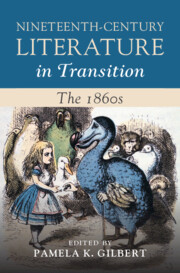Book contents
- Nineteenth-Century Literature in Transition: The 1860s
- Nineteenth-Century Literature in Transition
- Nineteenth-Century Literature in Transition: The 1860s
- Copyright page
- Contents
- Figures
- Contributors
- Introduction
- Chapter 1 Realism and Psychology
- Chapter 2 Sensational Bodies
- Chapter 3 Irish Rebellion on the Sensational Stage
- Chapter 4 Palgrave’s Golden Treasury
- Chapter 5 Impossible Monsters, Rabbit Holes, and New Worlds
- Chapter 6 Periodicals, Popular Fiction, and the Affordances of Digital Collections
- Chapter 7 Publishing in the 1860s
- Chapter 8 Italy in Transition
- Chapter 9 Silent Center, Vocal Margins
- Chapter 10 Empire and Evidence in Armadale and the Morant Bay Rebellion
- Chapter 11 Reading the Nonevental
- Chapter 12 An Age of Mythmaking
- Chapter 13 Reimagining Society
- Chapter 14 Historical Ecologies in Heterodox Economic Thought and Literary Realism of the 1860s
- Chapter 15 Extraction, Exhaustion, and the Sensation Novel of the 1860s
- Chapter 16 Evolution and the Human
- Bibliography
- Index
Chapter 1 - Realism and Psychology
Psychophysics, Mind, and the Science of Human Nature
Published online by Cambridge University Press: 01 February 2024
- Nineteenth-Century Literature in Transition: The 1860s
- Nineteenth-Century Literature in Transition
- Nineteenth-Century Literature in Transition: The 1860s
- Copyright page
- Contents
- Figures
- Contributors
- Introduction
- Chapter 1 Realism and Psychology
- Chapter 2 Sensational Bodies
- Chapter 3 Irish Rebellion on the Sensational Stage
- Chapter 4 Palgrave’s Golden Treasury
- Chapter 5 Impossible Monsters, Rabbit Holes, and New Worlds
- Chapter 6 Periodicals, Popular Fiction, and the Affordances of Digital Collections
- Chapter 7 Publishing in the 1860s
- Chapter 8 Italy in Transition
- Chapter 9 Silent Center, Vocal Margins
- Chapter 10 Empire and Evidence in Armadale and the Morant Bay Rebellion
- Chapter 11 Reading the Nonevental
- Chapter 12 An Age of Mythmaking
- Chapter 13 Reimagining Society
- Chapter 14 Historical Ecologies in Heterodox Economic Thought and Literary Realism of the 1860s
- Chapter 15 Extraction, Exhaustion, and the Sensation Novel of the 1860s
- Chapter 16 Evolution and the Human
- Bibliography
- Index
Summary
This chapter highlights the newly significant role of embodiment in the discourses of realist aesthetics and theory of mind across the 1860s. Developing conterminously (though not in lockstep), the discourses of aesthetic realism and psychology at this time endowed material reality – including the mind – with new relevance, insisting on the interdependence of body and mind and on the fundamental sameness of scientific and psychological inquiry, whose shared pursuit was advancing the “science of human nature.” More particularly, this chapter moves beyond a familiar emphasis on the role of visual aesthetics to feature other emergent or developing discourses important to realism, including theories of sound, psychology and perception, and motion, and even ital atomic theory and what E.S. Dallas, in The Gay Science (1866), described as “the science of the laws of pleasure.”
Keywords
- Type
- Chapter
- Information
- Nineteenth-Century Literature in Transition: The 1860s , pp. 16 - 35Publisher: Cambridge University PressPrint publication year: 2024

